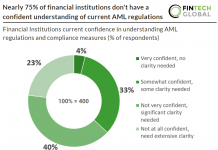A recent blogpost by financial industry association Mobey Forum has examined how the movement to make finance more sustainable is changing the banking industry.
According to Mobey, the sustainable trend presents the banking industry with unique opportunities to deepen customer relationships and is also challenging players to innovate through the development of new products and services that addresses certain environment goals.
The company cited research by Deloitte that found three out of every five banking customers in the UK said they wished their banking provider did more to create a positive, social and environmental impact.
Many FinTechs and banks are now putting sustainability at the front-and-centre of their business models as environmental impact comes to the forefront for more consumers. This is also proving to make business sense, with Mobey citing the average customer deposits at Tomorrow Bank – a German neobank focused on sustainability – are four times higher compared to the industry standard for a neobank.
Banks and FinTechs are also benefitting from a widening of the product market for green finance products, with green bonds and investment instruments already offered by most major banks. In the cases of NatWest and Nordea, the banks have launched carbon calculators that estimates the carbon footprint of their customers based on spending data.
Mobey gave other examples of Barclays and ABN Amro, who are offering better mortgage rates to customers who are building environmentally friendly houses, as well as mentioning Danskebank, who are offering a green mortgage that offsets the bank’s own carbon footprint.
However, Mobey underlined that setting up green and sustainable initiatives in banks ‘requires the right mindset and corporate culture’, adding that the senior management teams of banks need good awareness and understanding of the topic specifically on the areas of regulatory pressure.
Mobey detailed that a key hurdle for companies is transformation. It underlined that innovation of new financial products that use data – such as carbon calculators – require banks to have a ‘modern approach’ to big data.
The firm concluded, “While these challenges persist, the sustainability trend in banking is undoubtedly moving from strength to strength. Over the next 12 months, we can expect to see more banks participating by creating innovative green solutions that both reduce their carbon footprint and help their customers live more sustainably. This is a welcome shift and a substantial win for banks, consumers and the planet.”
The full blogpost can be found here.
Sustainability – alongside being vitally important – is all the rage in the FinTech sector right now. Earlier this year, BNPL giant Klarna became the first FinTech to join The Climate Pledge and Race to Zero campaign and commits to reaching zero carbon emissions by 2040.
Elsewhere, Virgin Money collaborated with FinTech data expert company, Life Moments, to focus on the development of the sustainability elements for its business banking customers.
Copyright © 2021 FinTech Global











